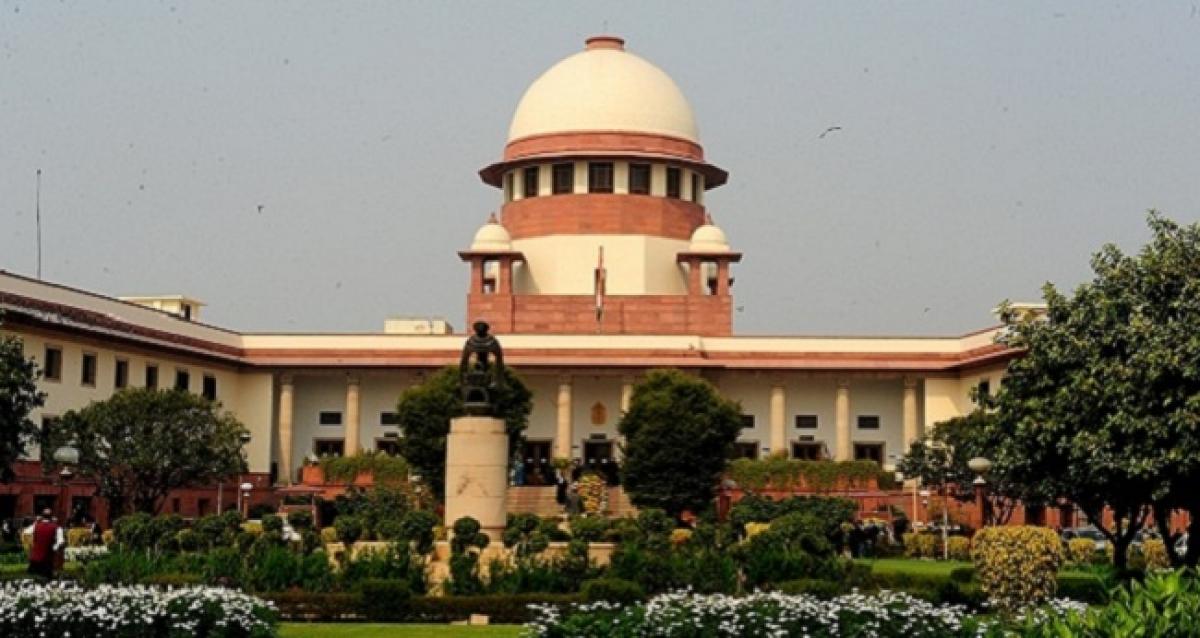Live
- Haribabu to take oath as Odisha Guv on New Year’s eve
- Back from Delhi…CM on search for new CS, DGP
- No compromise on law & order: CM
- Seven-day national mourning in respect of Dr. Manmohan Singh
- 'I've lost a mentor and guide': Rahul Gandhi grieves demise of Dr. Manmohan Singh
- 'Great loss for all of us': President Droupadi Murmu mourns Manmohan Singh's demise
- Dr Singh presented milestone budget of 1991 which liberalised Indian economy: FM Sitharaman
- PM Modi condoles demise of Dr. Manmohan Singh
- Former Prime Minister Manmohan Singh Dies at 92: A Legacy of Economic Reforms
- Nagesh Trophy: Telangana, Gujarat dominate action on Day 4 with easy wins
Just In

The Supreme Court on Tuesday declined to disqualify candidates against whom cognisance of chargesheet have been taken by courts, saying no further disqualification under the law could be added but urged Parliament to enact a law to address the malaise of criminals entering legislatures
New Delhi: The Supreme Court on Tuesday declined to disqualify candidates against whom cognisance of chargesheet have been taken by courts, saying no further disqualification under the law could be added but urged Parliament to enact a law to address the malaise of criminals entering legislatures.
At the same time, the apex Court directed political parties to post on their websites and widely publicise in the media, both print and electronic, full details of the criminal charges against the candidates they would be fielding in elections.
Pronouncing the judgment, a five-judge Constitution Bench headed by Chief Justice Dipak Misra also said that the law on criminals entering politics should also address fake cases being instituted against political opponents.
The court said that the time had come for Parliament to enact a law to "cleanse the polluted stream of politics" by prohibiting people with criminal antecedents in the political system. "The nation eagerly waits for such legislation ... and the sooner the better, before it becomes fatal to democracy," the court added.
The court directed that the candidate as well as the concerned political party "shall issue a declaration in the widely circulated newspapers in the locality about the antecedents of the candidate and also give wide publicity in the electronic media", said Chief Justice Misra, speaking for the five-judge Constitution Bench.
"When we say wide publicity, we mean that the same shall be done at least thrice after filing of the nomination papers," said the bench, also comprising Justice Rohinton Fali Nariman, Justice A.M. Khanwilkar, Justice D.Y. Chandrachud and Justice Indu Malhotra.
The Constitution Bench said the society had a "legitimate expectation to be governed by proper constitutional governance. The country feels agonized when money and muscle power become the supreme power", it said.
The apex court called for "substantial efforts" to prohibit people with criminal antecedents so that they do not even "conceive of the idea of entering into politics" and should be "kept at bay".
It said: "We are sure, the law making wing of the democracy of this country will take it upon itself to cure the malignancy. We say so as such a malignancy is not incurable. It only depends upon the time and stage when one starts treating it.
"It is one thing to take cover under the presumption of innocence of the accused but it is equally imperative that persons who enter public life and participate in law making should be above any kind of serious criminal allegation," the court urged Parliament
Under the criminal law, an accused person is presumed to be innocent till convicted by the court.
Holding that "informed choice" is the cornerstone to have a "pure and strong democracy", the court said: "The complete information about the criminal antecedents of the candidates forms the bedrock of wise decision-making and informed choice by the citizens."
Issuing a slew of directions to the political parties and prospective candidates, the court directed that the candidate contesting elections "shall state, in bold letters", about the criminal cases pending against him/her in the form provided by the Election Commission at the time of filing nomination papers.
The court directed that a candidate contesting election on the ticket of a political party would inform the party about the criminal cases pending against him/her and that party "shall be obligated to put up on its website" information on criminal antecedents of the candidate fielded by it.
"We have issued the said directions with immense anguish," the court said.

© 2024 Hyderabad Media House Limited/The Hans India. All rights reserved. Powered by hocalwire.com







